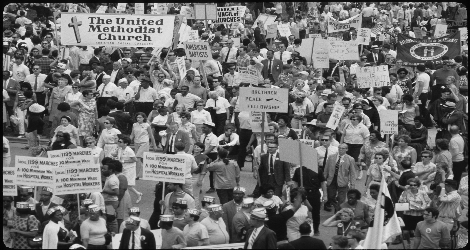[wpcol_1half id=”” class=”” style=””]
Conclusion
Ultimately, as we have seen, the theory undergirding western capitalism is based on underlying values, values which color its interpretation of the facts it tries to analyze. In short, this economic theory exalts liberty over responsibility, the individual over the community, and property over piety. As such, laissez faire economic theory does not adequately address the reality that human freedom is both destructive and creative. For these reasons, theological conservative, Carl F.H. Henry, insisted that capitalism not go unquestioned. He wrote:
Once it is fully understood that there are no natural harmonies and equilibria of power in history as in nature, that advancing civilization tends to accentuate rather than diminish such disproportions of power which exist in primitive communities, then it must be understood that property rights become instruments of injustice—free enterprise at least intrinsically incorporates certain economic values, notably a certain legitimacy of self-interest and the propriety of private property that can become idolatrous if taken out of the larger moral context.
[/wpcol_1half] [wpcol_1half_end id=”” class=”” style=””]
The larger moral context is that there is a mismatch of values between the way Christian theology describes the purpose and ends of human action and life and the way that our current economic system describes them. Henry claims that present economic theory exalts consumption in such a way that can only be regarded as condoning greed. It values self interest above self sacrifice and freedom more than responsibility to the other. In addition, the moral imperative in the worldview painted for us by our prevailing economic theory is production, and, in the worldview presented in the Bible, just distribution.
Markets have strengths that can be harnessed for the greater good of human societies. Though theology and economic theory are distinct disciplines, they both seek answers to the basic questions of human identity and purpose. We do not need to reject theology for economic theory, or vice versa. But we do require consistency. The fact is that there are values informing the development of our Western economic theory which are incompatible with the values inherent in our dominant Western theological tradition. We need to recognize these incompatibilities so that we might advocate a more coherent and theologically responsible set of values, in place of present unexamined assumptions that frequently contradict each other.
[/wpcol_1half_end]
The Rev. Elisa Owen is currently serving as pastor of the First Presbyterian Church of Lawrenceburg, KY. She has also served as interim director of youth and families at Highland Presbyterian Church in Louisville, KY, and pastor of Madison Presbyterian Church in Madison, IN. Before attending Princeton Theological Seminary and being ordained, Elisa attended college at Emory University in Atlanta, GA, where she earned a BA in Political Science and Economics. She then received a Master’s degree in International Relations and Economics from the Johns Hopkins School of Advanced International Studies in Washington, D.C. In addition to her ministry, Elisa has worked in the government, the private sector, and the non-profit sector on economic policy. Her previous employment includes the Office of the United States Trade Representative, the National Economic Research Associates (a consulting firm on energy practice), and the International Institute for Energy Conservation, where she was senior project manager for Latin America. In addition to her current duties as a pastor, she serves now as Executive Director of a non-profit dedicated to constructing the local food economy in Louisville, KY, in part by scaling up composting and green business that will contribute to the non-profit’s economic sustainability.
Notes
[1] For an example of this type of Weberian argument, see Richard Doster, “Christianity and Capitalism: Can Christians Reclaim Capitalism,” By Faith: The Web Magazine of the PCA, Issue 27 (April 2010), http://byfaithonline.com/page/ordinary-life/christianity-and-capitalism. Doster writes that in spite of the of the “rough couple of years” through which American style capitalism has passed, it is in fact compatible with Christian principles because: a) it encourages creativity, people to live out their imago dei calling to be co-creators with God; b) it creates wealth and when it does, that rising tide lifts all boats, i.e., the economic pie grows for everyone’s benefit, not just the few; c) the income gap between the rich and poor is not the problem, the creation of wealth is the problem. The issue, in other words is not that 3 men, Warren Buffett, Bill Gates and Carlos Helu control more wealth than 600,000,000 of the world’s other people, the issue is why is it that those other 600 million have failed to create more wealth? That is where Christians concerned with economic injustice should focus according to Doster; d) The ends of business may appear to be selfish but they are actually a force for good and not evil. Business writ large may in fact be, “the greatest force for good today because it increases prosperity, ends poverty, improves the quality of life, and promotes the health and longevity of the world’s population;” e) Justice does not demand equality of reward. The scripture passages Doster uses to “prove,” despite other scriptural voices discouraging hoarding and an unequal distribution of wealth, that in God’s Kingdom there are varying rewards include Luke 19: 17-19 and 2 Corinthians 5:10 among others; f) Capitalism encourages us to work hard, which keeps us out of trouble; and finally, g) the creation of wealth that capitalism offers is the best way to lift the poor out of poverty and, thus, the spread of capitalism is God ordained and reflects God’s heart for the poor.
[2] See for example www.actoninstitute.org, “integrating free markets with Judeo-Christian principles, and http://www.torenewamerica.com/democratic-capitalism-review, for a review of a Michael Novak book The Spirit of Democratic Capitalism for just a few examples of how the argument that capitalism is “God-ordained” runs. See also the work of Max Weber, German sociologist and political economist and Max Stackhouse, a former professor of ethics at Princeton Theological Seminary, for expositions of this view.
[3] Stephen Long, Divine Economy: Theology and the Market (London: Routledge, 2000), 218.
[4] Walter Owensby, Economics for Prophets (William B. Eerdmans Press: Grand Rapids, MI, 1988), 34-36.
[5] As quoted in ibid, 36.
[6] Ibid, 40.
[7] Ibid.
[8] Carol F. Johnston, The Wealth or Health of Nations: Transforming Capitalism From Within (Cleveland: Pilgrim Press, 1998). Wikipedia summarizes the pre-modern view: “The classical economists also employed the word ‘capital’ in reference to money. Money however was not considered to be a factor of production in the sense of capital stock, since it is not used to directly produce any good.” http://en.wikipedia.org/wiki/Factors_of_production.
[9] Walter Owensby, Economics for Prophets, 17.
[10] Ibid, 21.






Unbound Social